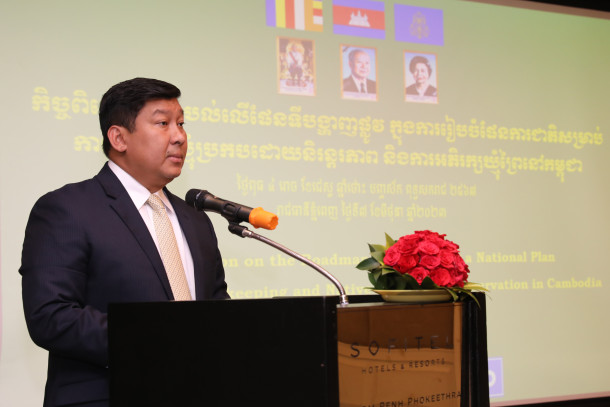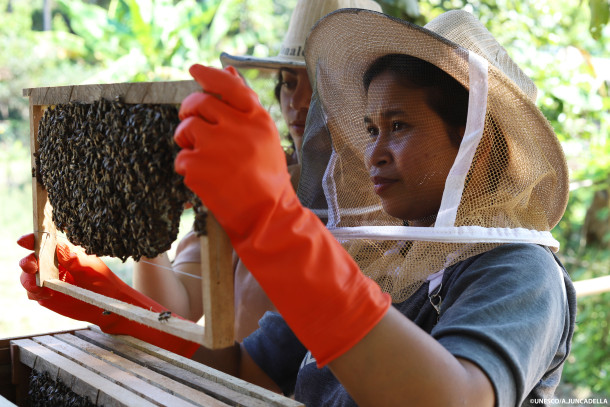News
Consultation on the Roadmap for Preparing a National Plan for Sustainable Beekeeping and Native Honey Bee Conservation in Cambodia

The consultation was presided over by H.E. Dr. Say Samal, Minister of the Ministry of Environment and addressed by Mr. Sardar Umar Alam, UNESCO Representative to Cambodia, and H.E. Duong Virorth, Advisor of the Asian Cultural Council, and around 60 senior officials from line ministries, development partners, social enterprises, and relevant stakeholders attended the consultation.
H.E. Dr. Say Samal, Minister of Ministry of Environment stated that “Improving the livelihoods of local communities is one of the priorities of the Ministry of Environment.” In this regard, the Minister called for greater attention on beekeeping, honey product diversification and branding. The Minister emphasized on three primary tasks for Cambodia including: 1) development of a National Plan for sustainable beekeeping and native honey bee conservation in Cambodia; 2) local and international market identification; and 3) extensive promotion of bee based products.
During his welcome remarks, Mr. Sardar Umar Alam expressed his appreciation for the high-level participation and leadership from the Royal Government of Cambodia for promoting sustainable beekeeping and native honey bee conservation in Cambodia, and stressed its importance as an alternative income-generation livelihood opportunity for local communities. He also provided an overview of UNESCO’s scientific assessments and pilot initiatives which have contributed to the development of the Roadmap towards the National Plan.

H.E. Doung Virorth, Advisor of the Asian Cultural Council, highlighted the importance of beekeeping as a sustainable and profitable activity that can benefit rural livelihoods and further called for enhanced public-private partnerships to develop and implement the National Plan to promote biodiversity conservation, food security and employment opportunities for communities, including through the TECHO 100 Village project.

During the consultation, Mr. Eric Guerin, UNESCO Expert on Beekeeping, briefed all participants on the key components of the Roadmap, which include the current status of beekeeping and bee conservation in Cambodia and all relevant existing regulations and policies from the aspects of bee conservation, honey production, and honey value chain and trade. The Roadmap outlines the requirements and recommendations to develop a National Plan for Sustainable Beekeeping and Native Honey Bee Conservation in Cambodia, following extensive scientific assessments and stakeholder consultations, including with relevant ministries from the Royal Government of Cambodia, the private sector, honey producers, and NGOs.
The presentation on the Roadmap drew active discussion among participants from relevant line ministries from the perspectives of commerce and trade for honey export and the registration of geographical indication (GI) products, the use of technology, research and environmental conservation. Drawing on these feedback collected during the consultation, UNESCO will continue to work closely with the Royal Government of Cambodia, particularly the Ministry of Environment, in finalizing the Roadmap and initiate the development of the National Plan, in close consultation with all relevant partners, to strengthen sustainable beekeeping practices and native bee conservation in Cambodia, as a viable alternative income-generation livelihood opportunity.
The roadmap is produced as part of the UNESCO and Ministry of Environment joint TSBR Project through the FAO Complementary Support to the Cambodia Programme for Sustainable and Inclusive Growth in the Fisheries Sector: Capture Component (CAPFISH-Capture), funded by the European Union, and the UNESCO-Guerlain global partnership.

Background
Cambodia has diverse landscapes and lush forests, and with four native honey bee species and 13 stingless bee species, there is a high potential to grow bee-based livelihood activities. In particular, beekeeping and wild honey collection present sustainable livelihood opportunities for lower income households. Furthermore, through pollination services, native bees play a crucial role in the conservation of Cambodian ecosystems and contribute to the food security and improvement of agricultural productivity.
To further explore the opportunities presented by Cambodia’s native honey bees, UNESCO launched the Rapid Assessment: Beekeeping Ecosystem at Tonle Sap Biosphere Reserve in July 2021. The assessment was conducted as part of the UNESCO x Guerlain partnership to promote biodiversity conservation and foster sustainable beekeeping through training and capacity development with a focus on women's empowerment. The assessment is a first-of-its-kind study of the beekeeping ecosystem in the Tonle Sap Biosphere Reserve (TSBR), and it outlines opportunities to explore the development of sustainable beekeeping.
Following the assessment, UNESCO launched a scientific pilot initiative on beekeeping. The pilot includes providing training and knowledge support on beekeeping to selected individuals; conducting awareness raising campaigns to build the knowledge of beekeepers, honey-hunters, policy-makers and the wider public on sustainable beekeeping and honey hunting practices; and developing bee-based livelihood activities including community-based apitourism programmes.









